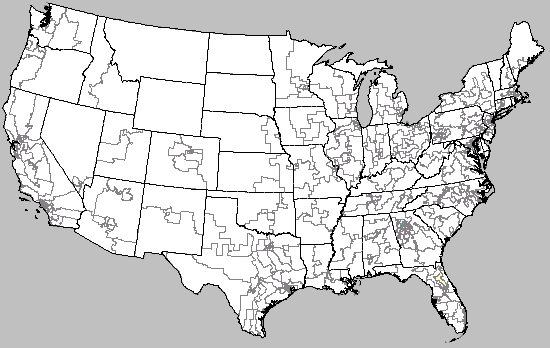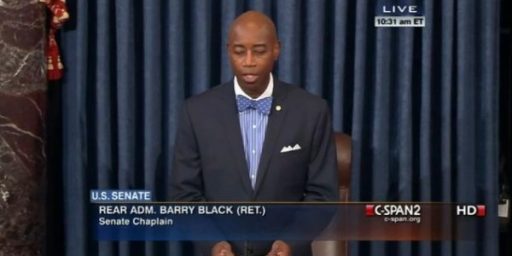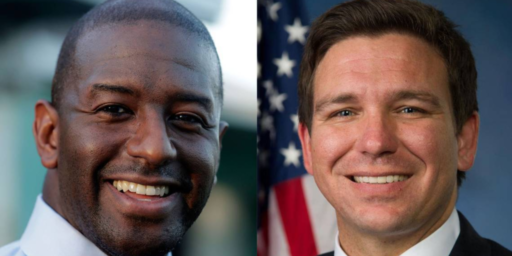Florida has to Redraw Districts
So a court has ordered.

Via NPR: DeSantis Florida redistricting map is unconstitutional and must be redrawn, judge says.
A Florida redistricting plan pushed by Republican Gov. Ron DeSantis violates the state constitution and is prohibited from being used for any future U.S. congressional elections since it diminishes the ability of Black voters in north Florida to pick a representative of their choice, a state judge ruled Saturday.
Circuit Judge J. Lee Marsh sent the plan back to the Florida Legislature with instructions that lawmakers should draw a new congressional map that complies with the Florida Constitution.
The voting rights groups that challenged the plan in court “have shown that the enacted plan results in the diminishment of Black voters’ ability to elect their candidate of choice in violation of the Florida Constitution,” Marsh wrote.
All of this follows some brazen politics on the part of Governor DeSantis:
In an unprecedented move, DeSantis interjected himself into the redistricting process last year by vetoing the Republican-dominated Legislature’s map that preserved Lawson’s district. He called a special session, submitted his own map and demanded lawmakers accept it.
There is where I point out that if we shifted away from single-seat districts to multi-seat districts with even modest proportional representation these kinds of problems would essentially vanish (and we would have better representation as a general matter, and likely have a multi-party system after several cycles). An appropriately sized House would help as well.






Wll, maybe.
First I imagine the state will appeal and try to run the clock out. You know, by the time they lose all appeals, it will be too late to change the map.
And then, they can do as Alabama did and ignore the court. Assuming there’s no enforcement mechanism for such court rulings.
Lots of things in lots of places would be different if only “X” would happen. Sadly, no one ever knows how to get to “X.” But I guess it’s better to be hopeful about potential solutions than to believe that the society is completely broken, or close to it.
[sigh…]
@Kathy: The enforcement should be that we don’t seat their representatives in Congress.
But it won’t be.
@Tony W:
With a Democratic majority, I’d estimate a 0.0000001% of that happening. with a Republiqan one, the odds go negative (not sure that that means).
Stephen, as I understand it, in an ideal world our current congressional system allows for regional interests to gain a voice they would not have if races drew on a much wider electorate. Agricultural regions in industrial states, fishing communities, the desert sides of the Pacific Coast states. Would multi-seat districts inevitable lead to a diminishment in reps that understand the special characteristics of such places?
So is it the map itself that is unconstitutional, or the process that put it in place? Is this just a “go back and follow the proper checklist” ruling, or must the end result preserve the majority-minority district in order to be compliant?
@Kathy: I would think that the court issuing the ruling could also hold key governmental officials in contempt of court and throw them in jail. But I’m not a lawyer.
@Jay L Gischer:
I’d really like to see that.
@MarkedMan:
That’s the way the founders thought but 200 years of history shows it doesn’t work that way in practice.
Ideally multi seat districts would make things better in that respect because you’d expect the regional interests to form minor parties apart from the main two parties to advance their interests.
Single seat districts (and “first past the post” voting are what steamrolls disparate interests into just two parties.
@Console: It used to be that the farm states and farming areas of non-farm states formed a powerful bloc on farm issues, and that coastal representatives acted in unison on issues of concern, regardless of party. This was true until the effects of Gingrich’s “revolution” took effect, which killed powerful and long term committee leads on the Republican side. Basically, it more or less worked the way I described for 200 years
@MarkedMan: If we could get to ~5000 or so representatives, we’d have much better representation of those niche groups. And the R’s would be decimated.
@Tony W:
Realistically, if the House is ever expanded, it won’t be that large.
Brazil has a population of about 205 million, and a presidential system with a bicameral legislature. They have about 510 seats in the lower chamber. Going strictly proportional, this yields 765 seats for a country with 330 million (all numbers are rounded down).
This would reduce the number of people represented per seat from around 758,000 to 431,000.
But then there’s Wyoming, the least populous state with about 580,000. To few to get two seats, too many to get one. So I’d favor a law setting the size of the House to fluctuate, by basing district sizes, withe very census, at half the population of the least populous state, however many seats that makes.
This would give Wyoming two seats, and mess up other smaller states. but larger states would see an increase in representation, and in how granular the representation is.
@Just nutha ignint cracker:
I don’t think one day it is just going to happen on day soon. I doubt Steven does either. 20 years ago, I have no idea how many people had a vague, or no, notion that proportional representation existed. I don’t know how many people know it exists now. At most it’s some concept in other countries they heard about in passing anywhere from the ages of 10 to 70 either in school or as they were on the edge of sleep in the recliner with potato chip crumbs all over their t-shirt.
What I do know is that Dems in DC and Republicans in several states passed laws banning ranked choice voting–even preventing implementation without transitioning to multi-member districts. That wasn’t really on any of our radars just a few years ago.
The point is any sort of political change starts with discussion just technological innovation is almost always preceded by theorista thoroughly examining ideas.
This is a general commentary and doesn’t necessarily relate to the news above.
When you draw a district to be more heavily minority/Democratic. It has an effect elsewhere- Adjoining district(s) more republican. If a District is say D+22 and the addition makes it D+26 the adjoining seats can go R+5 to R+8 or +9. Other than making it more favorable for a minority to be elected, it don’t help the party’s electoral chances in adjoining areas. Is that good for Dems or minorities?
Here in South Florida we have the 20th* (D+25), bordered by the 18(R+13), 21(R+7), 22**(D+7), 23(D+5), 25(D+9), and 26th(R+8) districts.
*- First drawn as a majority black district in 1992. It was represented by Alcee Hastings for 30 years.
**- My present district. I’m represented by Lois Frankel. The district boundaries in this area have been so much in a state of flux or drawn so tightly that I have been represented by Robert Wexler, Frankel, Allen West, and Ted Deutsch at one time or another over the last 20+ years. Yes we moved in 2019 but 3.5 miles which says something about the district boundaries.
@Kurtz: And I’m not accusing either of you of being that naive, either. As I note later, it’s probably better to be optimistic about the future than believe, as I do, that the society is pretty thoroughly and hopelessly broken.
Maybe by the time that my grandchildren are my age, the country will have reunited enough to address, and be interested in addressing, the structural flaws left behind by our government “of [some of] the people.” And given that I don’t have any children, that time frame really gives the nation considerable time.
@Bill Jempty: From what I understand (living in Washington State, where 6 0f 10 districts intersect Greater Seattle/Pugetropolis and the one district that isn’t majority white has no majority racial/ethnic group), the reason for creating majority-minority districts is because the outcome for whichever minority groups are being favored is better than separating them into districts where the impact of their vote will be negligible.
Maybe not “good” for minorities but, at least, “less bad.” As to whether it’s good for Democrats (as in the party), we’re not supposed to care. Republicans seem to disagree on this second point. They care very much. So, gerrymandering.
@MarkedMan:
Let’s say I concede the point. All we’ve done now is come to the conclusion that things worked before but they don’t work now. And Newt didn’t change the constitution or any laws. He just took advantage of the obvious: if you have a political interest then you use your party as a means to advance those interests.
Hoping that representatives will occasionally buck party line on regional interests is a very obtuse way of helping those interests and when it happens it happens in spite of the current system. Not because of it.
@Kathy: I could get behind that idea.
Do does Alabama, per an apple as court.
Soon, Wisconsin will have to, also.
With fairly drawn districts in NC, WI, MI, GA and SC, the Dems would own the house for a generation, at least.
@Kathy:
The “run out the clock” strategy worked in Ohio because it was an internal issue, with enforcement coming from the Ohio government that wanted to do the gerrymandering.
The Alabama and Florida cases are much different. Federal courts are more likely to just toss out a state’s congressional maps and insert their own. Which is exactly what the courts announced will happen in Alabama: https://www.cnn.com/2023/09/05/politics/alabama-congressional-district/index.html
@EddieInCA:
SC, really? SC delegation is 6 to 1 GOP to Dems. The only Democratic district is the 6th, which is D+14 and correct me if I’m mistaken drawn in order to be black majority. The other six districts + 7, 8, 21, 12, 12, and 11 all in favor of the GOP if you make the 6th less democratic, you will also for sure make it not black majority. The 6 republican seats in SC are all safe GOP. Unless you radically chop up the 6th, that isn’t going to change.
@Bill Jempty:
Federal Court Rules South Carolina’s Congressional Map is Gerrymandered
Yes. South Carolina.
@EddieInCA: And Democrats have flipped a house seat in SC once since 1988. Thinking anything is going to change there is wishful thinking.